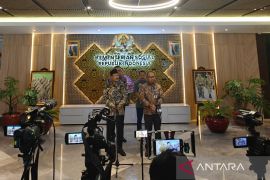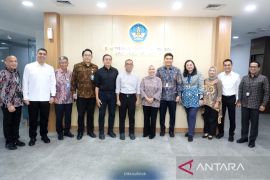The home affairs ministry had allocated a budget amounting to Rp6.3 trillion ($642 million) from the state budget for the introduction of e-ID cards nation-wide.Jakarta (ANTARA News) - The electronic identity (e-ID) card project has gained media attention due to the late arrival of equipment delaying the project`s implementation, and corruption allegations.
The e-ID card or e-KTP program was supposed to have been launched in several cities simultaneously on August 1, 2011.
But the local authorities concerned were forced to put it on hold because they had not received the necessary equipment, including computers, biometrics for finger print records, and IRIS eye retinal scanners reportedly imported from the United States.
The late distribution of the project`s logistics was mainly due to transportation and geographical problems, according to the home affairs ministry.
The cities included Jakarta, Palu (Central Sulawesi), Medan (North Sumatra), Palembang (South Sumatra), Kupang (East Nusa Tenggara), Malang (East Java), Lebak (Banten), and Bengkulu (Sumatra).
In the capital city, the delay in the logistics supply forced 10 "kelurahan" (urban ward offices) to cancel the launch of the e-ID program process initially planned for August 1, 2011.
The winners of a tender for the supply of the e-ID card production equipment were state-owned printing company Perum PNRI, PT Sucofindo, PT. Sandhipala Arthapura, PT Len Industri, and PT Quadra Solution.
"We ask for a guarantee on timely supply. The time target must not be missed," Home Affairs Minister Gamawan Fauzi said recently, adding that he had warned the companies to meet the delivery time targets.
The home affairs ministry had allocated a budget amounting to Rp6.3 trillion ($642 million) from the state budget for the introduction of e-ID cards nation-wide.
The ministry had reportedly requested an additional Rp 930 billion from the House of Representatives, saying it had overlooked hundreds of new subdistricts across the country.
The e-ID card program was expected to be implemented in two stages. The first stage in 197 districts/cities including Jakarta in 2011, with a total target of around 67 million residents to get the new ID cards. And the second stage in 300 districts/cities in 2012 targeting around 105 million people.
The Indonesia Corruption Watch (ICW), however, expressed pessimism that the e-ID could be completed as scheduled.
"I think it would be hard to meet the target. I am not optimistic considering the current condition," ICW researcher Tama S Langkun said recently.
Meanwhile, the Corruption Eradication Commission (KPK) said recently that it would report the Home Ministry to President Susilo Bambang Yudhoyono because the ministry ignored its corruption-prevention recommendations for the e-ID card program.
Deputy Chairman of KPK M. Jasin told the media that the Home Ministry had disregarded six KPK recommendations related to the e-ID project.
"These recommendations are preventive corruption measures so that the e-ID procurement will not inflict losses to the state and lead to corruption," he said.
KPK spokesman Johan Budi earlier said the body was analyzing a report by civil society organization Government Watch (GOWA) about 11 irregularities and violations it had found in the bid process, leading to alleged potential losses of Rp 1 trillion.
GOWA had previously reported suspected corruption in the home affairs ministry`s e-ID card project to the KPK.
Executive Director of GOWA Andi W Syahputra said there was suspicion that efforts had been made to let certain consortia win the tender on the e-ID card project.
The financial loss to the state could reach Rp1 trillion if there had been corruption in the process of the e-ID card project`s planning, budget proposal, up to the auction`s implementation, he said.
GOWA had conducted an investigation on the project from March to August 2011 and found indications of collusion in the procurement of the e-ID card equipment carried out by the home affairs ministry`s directorate general of population and civil registration, he said.
The NGO`s forensic investigators had found 11 visible irregularities and violations in the equipment`s procurement tender, he said.
Raydonnyzar Moenek, the home affairs ministry`s spokesman, denied the corruption allegation and asked GOWA to stop the accusation or the NGO would face legal consequences.
"GOWA`s accusation is wrong and baseless, and it tends to be misleading," he said.
Moenek on Wednesday (Sept 14) said of the KPK`s six recommendations regarding the new ID card program, the home ministry has implemented five.
Separately, Lintas Peruri Solusi, a consortium that lost the bid to implement the e-KTP program, reported several ministry officials to the Jakarta police on Tuesday (Sept 13) over allegations of tender rigging.
Handika Honggowongso, a lawyer for the consortium, said the group lost the project even though its offer was Rp 1.2 trillion less than the lowest bid.
"There is a conspiracy and we suspect that the budget for the program was inflated. Lintas Peruri Solusi has performed similar projects and we could have brought the cost down to Rp. 4.5 trillion," Handika said.
He accused ministry officials in charge of the tender of receiving Rp 50 million cash bribes from each of the three winners - PNRI consortium, Astra consortium and Mega Global consortium. "The contract was signed during a period when disqualified companies could still challenge their disqualification," Handika said.
PNRI had won the tender of the project worth Rp5.9 trillion with the offer ceiling at Rp5.6 trillion, while the Lintas Peruri Solusi consortium had submitted an offer at Rp4.75 trillion.
Handika said the tender committee should have been able to make the project cost more efficient by 20 percent in the e-ID project tender participated in by eight consortiums.
The tender process should be once again be held due to the alleged irregularities as discovered by the Government Procurement Policy Institute/Government Services (LKPP) and the ICW, he said, adding that Minister Gamawan Fauzi should also be investigated.
Minister Fauzi Gamawan had earlier said he had asked the KPK to help monitor the project`s implementation to prevent corruption in the procurement of the needed equipment.
"We need to be careful with the budget because it requires around Rp 6 trillion ($642 million)," Home Affairs Minister Gamawan Fauzie said last year.
Commenting on the recent allegations, the minister said he welcomed anyone wanting to investigate the project.
The process of the e-ID project has been transparent since the beginning and the ministry has continuously communicated with the Parliament about the project, he said earlier this month.(*)
Reporter: by Fardah
Editor: Heru Purwanto
Copyright © ANTARA 2011











